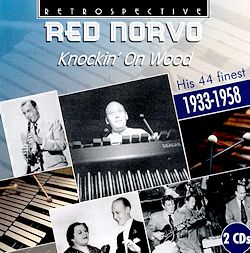 BUY NOW AmazonUK AmazonUS |
RED NORVO
Knockiní on Wood; His 44 finest 1933-1958
|
One thing is clear from this twofer retrospective; over a quarter-century Red Norvo always kept up with the times. From his 1933 sides with Jimmy Dorsey to the fiery finale of his orchestra in 1958, led by the exultant trumpets of Don Fagerquist and Conrad Gozzo, Norvo effortlessly, tastefully and eloquently absorbed new idioms into his playing and his ensembles whilst remaining recognisably himself.
He moved between xylophone, marimba (much less often), and vibes. He was always interested in new harmonies but also in ensemble colour. Listen to his marimba playing on Bixís In a Mist and the inventive way he casts Benny Goodmanís bass-clarinet as a colouristic and expressive device, for example, His swing-era small groups starred some players as elegant and precise as he; Teddy Wilson, principally, whose name reappears time and again in the Norvo discography. And he had a reservoir of talent on which he could call for his recording sessions; his Swing Octet contained Bunny Berigan, Jack Jenney and Chu Berry with Wilson and Gene Krupa driving the rhythm section and the results speak for themselves. Berigan is punchy on Bughouse and Chu Berry rhapsodises in the Blues in E flat in the way he had for Spike Hughes in his New York sessions.
The 1936 big band had the huge advantage of Eddie Sauterís superior arrangements and the presence of Norvoís then wife, Mildred Bailey, who has her own twofer in this series (RTS 4344). Around this time Harry Jamesís popularity encouraged a number of summit meetings. He teamed up with Albert Ammons, for example, on the Boogie masterpiece Woo-Woo (on Retrospective RTR4367) but a couple of years earlier he had recorded the blues Just A Mood with Norvo, Teddy Wilson, and John Simmons, the acme of relaxed chamber jazz. The war years saw a sequence of V-Discs, all of which stretched out a minute longer than his usual three-minute 78s and thus gave added opportunities for longer solos. Itís no coincidence, given the morale-boosting nature of these sides, that they are booting swingers. Toward the end of this first disc we hear one of the Goodman sextet recordings from 1945, in which Norvo plays with Wilson, guitarist Mike Bryan, bassist Slam Stewart and drummer Morey Feld.
The second disc charts the years 1945 to 1958, the post-war years dramatically brokered by the arrival of Dizzy Gillespie and Charlie Parker in a rather unusual Comet 78. An example of the electricity generated in a live Novo date can be savoured in the performance of The Man I Love from Town Hall, New York. Almost all the bands in this twofer are Norvoís own but there are a couple of exceptions, one of them being Woody Herman and his Woodchoppers who play the Norvo-Shorty Rogers composition Igor with conspicuous fire. The interweaving saxes of Jimmy Giuffre and Dexter Gordon irradiate the 1947 LA session for Capitol and thereís the occasional slice of levity, as in the quirky rendition of Twelfth Street Rag or the Latin rhythms ofNight and Day or in the stylish reworking of Zing! went the Strings of My Heart.
Recorded in April 1953 for Decca with Jimmy Raney and Red Mitchell, Lover, Come Back to Me sounds very much like the kind of thing the MJQ produced with its Baroque hues but Tenor Blooz, with Art Pepper, is straight-ahead Bop. Around this time Norvo revisited Just A Mood, made two decades before, this time with Sweets Edison, Ben Webster, Jimmy Rowles in the Teddy Wilson role, bassist Bob Carter and drummer Bill Douglass. Whilst looking back he was facing the future, soon to mine his inner Basie for a superb big band Brittís Blues in January 1958. Itís at this point that the compilers say farewell to the Norvo songbook, though he was to continue playing until 1986 and lived on until 1999.
Digby Fairweather is back in the sleeve note saddle with superior results and compilation and remastering alike are first-rate. If you have a lacuna in your Norvo collection, make for this twofer.
Jonathan Woolf